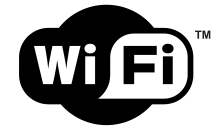Wi-Fi
 The old Wi-Fi Alliance logo. | |
| Introduced | September 1998 |
|---|---|
| Compatible hardware | Personal computers, gaming consoles, televisions, printers, mobile phones, tablets. |
Wi-Fi is a way of connecting to a computer network using radio waves instead of wires. It was invented to connect computers that are near each other, and nowadays is much used for Internet connections.
The Wi-Fi Alliance says Wi-Fi is any "wireless local area network" (WLAN) that follows the Institute of Electrical and Electronics Engineers' (IEEE) 802.11 specification. A Wi-Fi device can work with any Wi-Fi network anywhere in the world.
The word Wi-Fi is a play on words with hi-fi, and was invented to replace the name "IEEE 802.11b Direct Sequence Spread Spectrum".[1][2][3]
As of 2013, most wireless networks use one of two radio frequency bands. These are not the only two bands, but are the most used. One of the bands is at around 2.4 GHz, and the other is at 5 GHz. Both of these have benefits and drawbacks: The 2.4 GHz band is widely used, and devices are usually cheaper. Microwave ovens, DECT telephones and other wireless devices also use the 2.4 GHz band, and sometimes cause interference which slows transmissions. The 5 GHz band has more frequencies and usually less interference, but there are more rules for using it. In some places, the 5 GHz band may not be used outdoors. Because fewer devices use the 5 GHz band, devices that do are often more expensive.
The World Health Organization (WHO) says that Wi-Fi is not dangerous.[4][5]
Related pages[change | change source]
References[change | change source]
- ↑ "WiFi isn't short for "Wireless Fidelity"". boingboing.net. 2005-11-08. Archived from the original on November 24, 2005. Retrieved 2007-08-31.
- ↑ "Wireless Fidelity' Debunked". Wi-Fi Planet. 2007-04-27. Retrieved 2007-08-31.
- ↑ "What is the True Meaning of Wi-Fi?". Teleclick. Archived from the original on 2012-09-11. Retrieved 2007-08-31.
- ↑ "Electromagnetic Hypersensitivity (EMS)", 2011
- ↑ Q&A: Wi-fi health concerns, BBC News
Other websites[change | change source]
- Wi-Fi Alliance
- Free WiFi - A list of free Wi-Fi around the world
